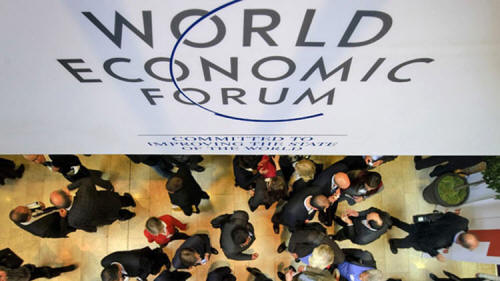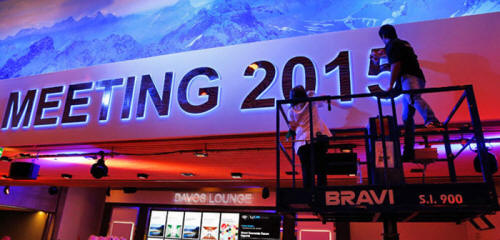|

January 20, 2015
from
RT
Website
Spanish
version

The Davos meeting is not looking for
world crisis solutions but plotting more controls, 'banksterism'
and power elite benefits, says economic journalist
Lew Rockwell.
They are going to tax and rip off their
own people to even greater extent, he added.
RT:
The main theme of the Davos forum in the past has largely
been finding solutions for world economic problems. How about
today? Is it still about that?
Lew Rockwell:
No, it is actually about control. I think it has
always been about control for
the US Empire, for the
oligarchs associated with it.
They may talk about wanting to
solve problems, or make people's lives better, [but]
what they actually are doing is plotting even more wars,
interventions, more economic controls, more 'banksterism',
more benefits to
the power elite versus the
people.
We don't know what is going on
there. I'd like to put chest cams on all of them so we can see
what they are doing, what they are talking about. It is not good
for the cause of freedom, for the cause of prosperity, not good
for the cause of human rights what goes on in Davos.
RT:
Mr. Norman, let's talk about numbers.
For example, this year companies
have to pay $20,000 per executive for a ticket. A simple dinner
in an average restaurant was $40 last year. A night in a
mid-range hotel has gone from roughly $600 to $700.
Do the Forum's participants need
all these special arrangements to make an effective decision?
LR:
It is a meeting of
the very rich and it's a
meeting of the politicians that they own.
They all live very well; they are
not staying in the middle range hotels and are not eating at the
regular restaurants. They are having the times of their lives;
they lived the life of riley at the expense of everybody else. I
don't think we need to worry about cost to them.
They are happy to spend the money.
It is not theirs after all; they are taking it
from the rest of us.
“[Davos] is a distraction but
it is worse,
it perpetuates this myth that
somehow
the world economy is made
better by
the elite gathering together
and controlling and
planning the world economy.”
Philip Booth, Institute of
Economic Affairs,
on World Economic Forum in
Davos 2015.
RT:
This year's discussion of "The New Global Context" was meant
to capture the post-financial-crisis reality of
anti-globalization on the major markets and economies.
And now that the oil prices have
already fallen, and with all economies affected in some way by
sanctions, don't you think that it is too late for a meeting
like that?
LR:
If the meeting was what it pretended to be - no, it's never too
late to have good discussions and learn something and perhaps
come to some solutions.
The people who attend meetings like
this are the source of the problem. They are not looking at the
full aspect; they are not looking to fix anything. And there are
tremendous economic problems ahead with what's
happening to the euro, what the
Swiss just did.
There are all kinds of problems with
the dollar, the ruble, the euro - all these currencies are
having problems. The banks are having problems, people are
getting poor in the US…
We learn that from the government
propaganda… but the standard of living [of regular Americans] is
going down. And I can tell they don't care about that in Davos,
they just want to continue their own rip offs.
RT:
How do you see countries battling the global downturn?
LR:
I hope I'm wrong, but in virtually every single time that there
is a recession - caused by central banking by the way, this just
not come down to us like a rain from haven, these economic
troubles are caused by central banking and by governments -
typically what they do is they do everything wrong.
Everything governments do in this
kind of situation prolongs and deepens the economic troubles. Or
they can start a boom again as the US has done. But that has
horrendous results too.
They will talk about trying to fix
economic problems, they are making the economic problems but
they are responsible for even worse.

Reuters / Ruben
Sprich
RT:
What about the oil prices dip, how low can it go? What do
you see for the future?
LW:
I guess that the oil price could go deeper...
I myself don't know much of it is
economic causes, how much of it is political causes and it
attempts to ruin Russia, to ruin Iran; and also there are people
[who] want to get rid of all shale oil producers in the US,
Saudi Arabia, and so forth. So how much is political, how much
is an economic effect… but I think it is an effect on the world
recession.
There is a world recession going on,
it is getting worse. We are going to see the other prices,
commodity prices probably going down and the central banks are
desperately trying to inflate which would make things even
worse.
But they seem to be having trouble
doing it.
There is real trouble ahead and the
people who are making the trouble and the people who are coming
up with alleged solutions are the criminals that are responsible
for the situation as it is.
People would try to study some
economics, learn some real history, study some Austrian
economics; they get to understand what is going on, why these
guys are doing so much damage, and what we can do about it.
But we can't count on the power
elite at Davos or similar kinds of meetings to fix things for
us. Again they are the problem.
RT:
Why, do you think, many governments can't find the solution
to the current crisis situations?
LW:
Because all the governments care about is how it is going for
the government.
So they will tax and rip off their
own peoples to an even greater extent so they can continue to
live in style which has become a custom so their very high
pensions can be paid, so they can have the limos, and all the
rest of their fancy lifestyles.
That is again all they care about,
they will crash the people with taxes, with the police state,
with more regulations to control for the benefit of the big
banks, the big military contracts, they are going to start more
wars because they are all Keynesians and they have the view of
the evil John Keynes that the war is the benefit to the economy.
War is not a benefit of the economy
because it's horrendous cost to the economy even leaving aside
all the amount of sculls and destroyed property - the results
from these wars.
To start more wars is to hurt the
economy, kill a lot of people. But of course
the military contractors benefit,
politicians benefit, people don't benefit. This is the usual old
story.
Unfortunately, governments are far
bigger today and far more influential than they have ever been
in the history of the mankind. It's not good.
RT:
What effect will the dip in oil prices have on the US
economy?
LW:
It has a number of effects. It is good for consumers.
The consumers can pay less for a
tank of gasoline for their car. It's a good thing. It's not good
for producers, especially for producers that have financed
themselves with junk bonds and with other very risky means of
financing. Some of those are going bankrupt... The oil companies
are going to see their profits drop.
But we don't need to worry about
that.
We do need to worry about what the
government does to make things tougher for the oil industry. But
the oil industry if it were not for the government could take
care of itself.
I must say from my own stand point
the whole oil price is going much further down - $10 a barrel,
whatever. I'm sorry to say that all things are going to be true.
I think the oil price will be going
back up within the next year…
|


